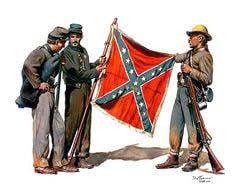Introduction to Our Heroes
In 1860, Georgia, like all of its southern state neighbors, was literally boiling over with the prospects of war. There was great excitement and talk about the coming war, but very little effort was being placed into preparation for it. The plantation life prevailed.
In Columbia County, Georgia, the citizens had been thriving for at least fifty years by planting. However, two things occurred that made this lifestyle flourish. In 1833, the railroad system started from Augusta towards what would become Atlanta. The railroad already existed from Charleston to Augusta. In 1844, the Augusta Canal opened. The railroad brought centers of commerce at every depot while the canal powered factories in Augusta to use the product. Now the Savannah River could be used even more effectively to support industry.
“Columbia then was the great feeder to Augusta, sending them annually her thousands of cotton bales. These were the haleyon days of Columbia, days when money was handled as if it grew on trees”.
The plantation system was booming and cotton was King. The 1859 Federal Census showed 802 families in Columbia County. There were 3,731 free whites, 8,300 slaves and 66 free people of color. However, research shows that hundreds of whites were not included in the census.
Research also shows that there were the extremely wealthy families and also those that were quite literally dirt poor. Of course, just as it is the case today, those with money generally had excellent educations while the poorer did not. Also, the rich generally raised, funded and led the military companies while the poorer became the privates.
The military companies were comprised mainly of planters or their sons, overseers of the plantations, farmers, some rail road workers, some gold miners, and many sawyers. Many of these men were the grandsons of Revolutionary War patriots. They came primarily from western Columbia County (today McDuffie County) and the panhandle area of Warren County. Towns noted in the soldier’s card files included Appling, Berzelia (a railroad depot near today’s Grovetown), Saw Dust (Harlem), Lombardy (Dearing), Kiokee, Raysville, Reedy Creek, Briar Creek, Wrightsboro, and Thomson.
In July 1861, war was imminent. Volunteer companies were being formed from all over the South and Columbia County was no different. Soon, three major companies would be formed: Ramsey Volunteers, Thomson Guards and the Hamilton Rangers.
In Columbia County, Georgia, the citizens had been thriving for at least fifty years by planting. However, two things occurred that made this lifestyle flourish. In 1833, the railroad system started from Augusta towards what would become Atlanta. The railroad already existed from Charleston to Augusta. In 1844, the Augusta Canal opened. The railroad brought centers of commerce at every depot while the canal powered factories in Augusta to use the product. Now the Savannah River could be used even more effectively to support industry.
“Columbia then was the great feeder to Augusta, sending them annually her thousands of cotton bales. These were the haleyon days of Columbia, days when money was handled as if it grew on trees”.
The plantation system was booming and cotton was King. The 1859 Federal Census showed 802 families in Columbia County. There were 3,731 free whites, 8,300 slaves and 66 free people of color. However, research shows that hundreds of whites were not included in the census.
Research also shows that there were the extremely wealthy families and also those that were quite literally dirt poor. Of course, just as it is the case today, those with money generally had excellent educations while the poorer did not. Also, the rich generally raised, funded and led the military companies while the poorer became the privates.
The military companies were comprised mainly of planters or their sons, overseers of the plantations, farmers, some rail road workers, some gold miners, and many sawyers. Many of these men were the grandsons of Revolutionary War patriots. They came primarily from western Columbia County (today McDuffie County) and the panhandle area of Warren County. Towns noted in the soldier’s card files included Appling, Berzelia (a railroad depot near today’s Grovetown), Saw Dust (Harlem), Lombardy (Dearing), Kiokee, Raysville, Reedy Creek, Briar Creek, Wrightsboro, and Thomson.
In July 1861, war was imminent. Volunteer companies were being formed from all over the South and Columbia County was no different. Soon, three major companies would be formed: Ramsey Volunteers, Thomson Guards and the Hamilton Rangers.


